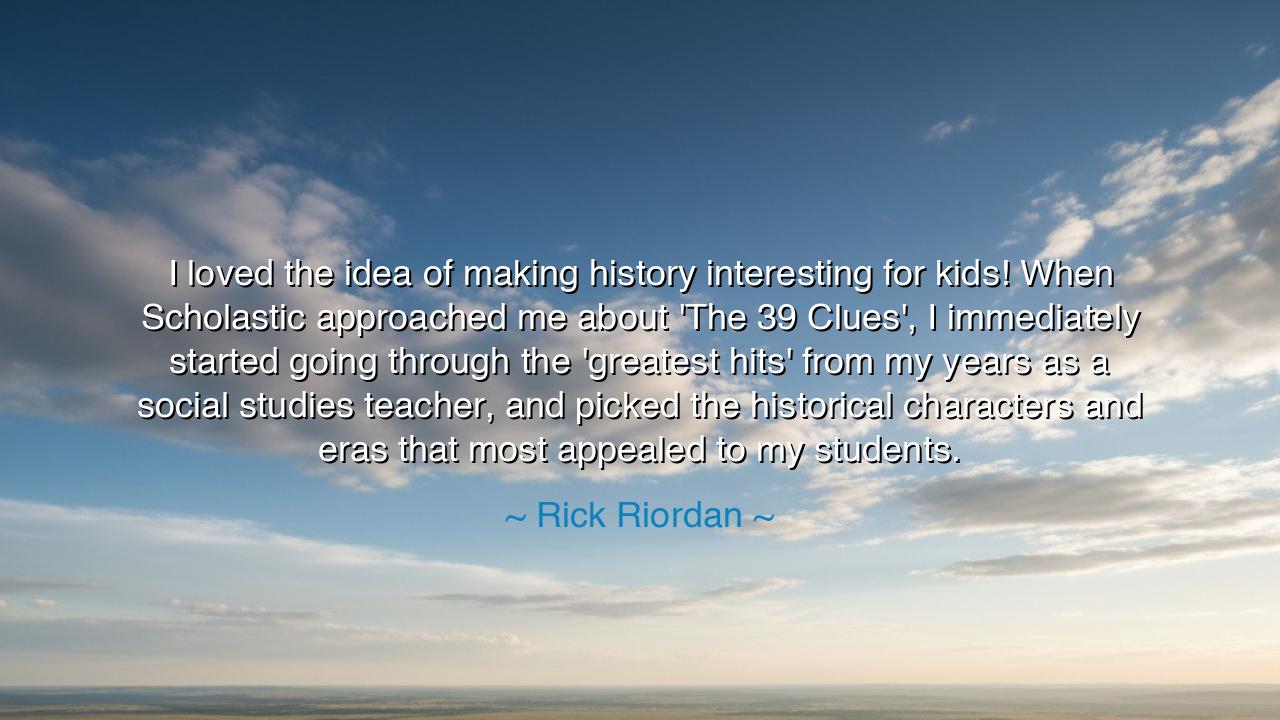
I loved the idea of making history interesting for kids! When
I loved the idea of making history interesting for kids! When Scholastic approached me about 'The 39 Clues', I immediately started going through the 'greatest hits' from my years as a social studies teacher, and picked the historical characters and eras that most appealed to my students.






When Rick Riordan declared, “I loved the idea of making history interesting for kids! When Scholastic approached me about The 39 Clues, I immediately started going through the ‘greatest hits’ from my years as a social studies teacher, and picked the historical characters and eras that most appealed to my students,” he revealed the heart of a true teacher. In his words, we see not merely the act of writing stories, but the noble mission of awakening curiosity in the young. To Riordan, history was not a dry list of dates and battles—it was a living theater of heroes, villains, revolutions, and discoveries. And his joy lay in transforming this theater into an adventure that children would embrace, not with boredom, but with wonder.
The origin of this quote lies in Riordan’s years as a teacher of social studies, guiding classrooms filled with restless young minds. He knew from experience that knowledge must be made alive to be remembered. Students do not carry facts in their hearts—they carry stories. So, when Scholastic asked him to create The 39 Clues, he did not open dusty tomes or compile statistics. Instead, he drew upon the moments that had stirred his students, the tales of explorers, inventors, rulers, and rebels that had lit sparks of fascination in their eyes. His wisdom was simple: to reach the hearts of children, one must speak the language of adventure.
This echoes an ancient truth. The philosopher Herodotus, called the “Father of History,” did not write his accounts as a scholar writing for scholars. He told them as stories, filled with drama, heroes, and turning points. He knew that the deeds of kings and the struggles of peoples must be remembered not in sterile analysis, but in the warm glow of narrative. So too did Riordan follow this ancient path: to make history into living memory, to dress the skeleton of fact with the flesh of story so that children might embrace it as their own.
Consider also the tale of Homer, whose epics were more than poetry. In The Iliad and The Odyssey, he carried the legends of Greece into the hearts of generations. These works were not mere entertainments—they were the very means by which Greek children learned of courage, loyalty, pride, and folly. Through storytelling, Homer taught his people who they were and what they might become. Riordan, in a modern way, continues this same legacy: to teach through narrative, to plant wisdom in young minds through characters and quests that echo across time.
From Riordan’s words we learn that teaching is not about the transfer of information, but about transformation through imagination. A teacher who makes facts dull has failed, but a teacher who makes history burn with life awakens a flame that may endure for decades. This is why Riordan’s books resonate—they are not just stories, but doorways. They invite children to step into history as participants, to walk alongside Lincoln, Napoleon, Mozart, or Cleopatra, and in doing so, to see themselves as heirs of that same great drama.
The lesson for us is this: if we wish to inspire others—whether children, friends, or even ourselves—we must present knowledge in the form of living stories. Do not speak only of data, but of people. Do not recall only numbers, but the passions, struggles, and triumphs behind them. Knowledge without story is a burden, but knowledge within story is a gift, light enough to carry joyfully.
Practically, let each of us act as Riordan did. When teaching, mentoring, or even sharing with loved ones, do not give only facts. Wrap those facts in tales that breathe. When you recall your own past, tell it as a story, so that others may see its meaning. When you read history, ask not just, “What happened?” but, “What did it feel like to live then? What sensations did those people know?” In this way, you will awaken not only memory, but wisdom.
Thus, Riordan’s words stand as a torch for all who teach and all who tell stories: make knowledge alive. For the human soul, especially the soul of the child, does not awaken to bare lists and records, but to tales that breathe. In this lies the true art of teaching, and in this lies the power to change generations.






AAdministratorAdministrator
Welcome, honored guests. Please leave a comment, we will respond soon